Caryn
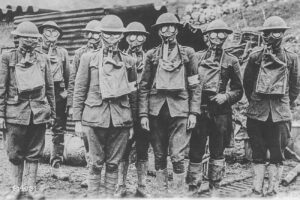 The initials “G.I.” bring a picture of a US soldier for most people They aren’t viewed as glamorous, and usually look like they have just crawled out of the trenches somewhere, but never is there a shred of doubt as to their toughness. The name, American G.I. is synonymous with “American infantryman.” Really, everything American Military was tagged G.I. When soldiers returned from World War II and now other wars or even non-wartime military service are eligible for the benefits of the “G.I.” Bill, including education. In fact, it was often the G.I. Bill that drew young recruits into the service in the first place. Let’s face it, college is expensive, and three years of service seems a small price to pay.
The initials “G.I.” bring a picture of a US soldier for most people They aren’t viewed as glamorous, and usually look like they have just crawled out of the trenches somewhere, but never is there a shred of doubt as to their toughness. The name, American G.I. is synonymous with “American infantryman.” Really, everything American Military was tagged G.I. When soldiers returned from World War II and now other wars or even non-wartime military service are eligible for the benefits of the “G.I.” Bill, including education. In fact, it was often the G.I. Bill that drew young recruits into the service in the first place. Let’s face it, college is expensive, and three years of service seems a small price to pay.
The American soldier was, and for patriots of our day is one of the most loved and respected groups of people 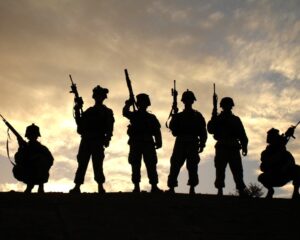 in the United States. They even inspired one of most popular toys in the 1960s and 1980s. the G.I. Joe doll, and later, G.I. Jane, inspired by Demi Moore in her movie with the same name. The dolls and the movie brought the G.I. Joe and Jane dolls to a whole new generation of kids.
in the United States. They even inspired one of most popular toys in the 1960s and 1980s. the G.I. Joe doll, and later, G.I. Jane, inspired by Demi Moore in her movie with the same name. The dolls and the movie brought the G.I. Joe and Jane dolls to a whole new generation of kids.
We all know about the G.I. dolls and soldiers, but do we know what G.I. means? Most of us truly don’t. Many people probably assumed it was something along the lines of “Government Infantry,” “General Infantry,” or perhaps a “Government Issue” label stamped on military rations and equipment. Those are good guesses, but they are also wrong. In fact, “G.I.” stands for “Galvanized Iron.” While that sounds like a tough thing, and  maybe that is to say that the soldiers were tough, the reality is that the name comes from something entirely different…and totally not exciting, tough, or even cool. In the early 20th century, believe it or not…military trash cans and buckets were stamped with the initials G.I. It wasn’t because they belonged to the military. but simply because galvanized iron was the material from which the cans and buckets were made. So, during World War I, the initials became a proxy for all things to do with infantry, and the usage stuck. So, I guess we can banish the initials, accept it as all things military, or maybe embrace the term as being the toughest of the tough and the strongest of the strong. I think I like the last one the best.
maybe that is to say that the soldiers were tough, the reality is that the name comes from something entirely different…and totally not exciting, tough, or even cool. In the early 20th century, believe it or not…military trash cans and buckets were stamped with the initials G.I. It wasn’t because they belonged to the military. but simply because galvanized iron was the material from which the cans and buckets were made. So, during World War I, the initials became a proxy for all things to do with infantry, and the usage stuck. So, I guess we can banish the initials, accept it as all things military, or maybe embrace the term as being the toughest of the tough and the strongest of the strong. I think I like the last one the best.
 The whole thing actually started with fraud. It was probably the first disaster in United States history to be caused by fraud. The Forest Hills disaster, which was also called the Forest Ridge disaster and the Bussey Bridge train disaster, was a railroad bridge accident that occurred on March 14, 1887, in the Roslindale section of Boston, Massachusetts.
The whole thing actually started with fraud. It was probably the first disaster in United States history to be caused by fraud. The Forest Hills disaster, which was also called the Forest Ridge disaster and the Bussey Bridge train disaster, was a railroad bridge accident that occurred on March 14, 1887, in the Roslindale section of Boston, Massachusetts.
It seems strange that an act of fraud could cause a disaster, but on that day, a morning commuter train was coming into Boston and was passing over the Bussey Bridge, a Howe truss, at South Street in the Roslindale neighborhood, located a half mile from the Forest Hills station. Suddenly, without warning, the Bussey Bridge collapsed. Several cars crashed to the street below. In the aftermath of the disaster, it was found that 38 commuters were killed, and 40 others were seriously injured.
There were nine cars on this train, and it was traveling over the Dedham Branch of the Boston and Providence Railroad. It was a bright and sunny Monday morning, and about 300 passengers, including several school children were on their way into Boston. The disaster struck when they were about six miles from Boston. As 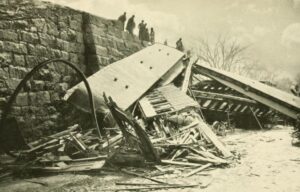 they crossed the Bussey Bridge, the locomotive and first two cars safely traversed the bridge, when suddenly, without any warning, the bridge just fell, taking the final six cars with it. It happened so fast that as the body of one of the cars fell, its roof tore off completely and landed on the embankment beyond the bridge. It was as if the roof kept going after the car dropped off of the bottom.
they crossed the Bussey Bridge, the locomotive and first two cars safely traversed the bridge, when suddenly, without any warning, the bridge just fell, taking the final six cars with it. It happened so fast that as the body of one of the cars fell, its roof tore off completely and landed on the embankment beyond the bridge. It was as if the roof kept going after the car dropped off of the bottom.
Any disaster brings great shock to a nation, or at least that area, and the suffering of the injured made it even worse. Some of the injured were impaled by splinters throughout their bodies and others were dismembered and yet others were badly mangled. As rescuers began their work, the very first body pulled from the wreck was a headless woman. It happens. A train wreck often mangles and dismembers bodies. There were also two young men who were pinned under a pile of rubble. A car stove full of glowing coals hung over them. Somehow, the doors of the stove stayed closed, and the bolts held it firmly in place. Strange things like that happen sometimes too. Those men were rescued. Somehow, they got a second chance.

So, how was fraud to blame, you might ask. In the aftermath, investigators found that the iron bridge design was quite poor. The bridge was never strong enough to carry the load of the rail traffic it had to serve. When they looked at the materials and the design, it was obvious. They also looked at the designer, Edmund Hewins. Their investigation exposed Hewins as a fraud. To make matters worse, the railroad had failed to inspect and properly maintain the bridge, even though they found nuts and bolts that had fallen from the bridge and were lying on the street below. They knew there were problems, but nothing was done, and the…it was just too late.
 Every time an airplane crashes, we expect the worst…multiple deaths, if not the death of everyone on board. Some crashes look so horrific that you wonder how anyone could possibly have lived. While dropping from the sky to land on the hard ground or even on water usually ends in devastation, once in a while, a miracle happens, and everyone on the plane walks away from the crash…everyone!! It can only be called a miracle crash.
Every time an airplane crashes, we expect the worst…multiple deaths, if not the death of everyone on board. Some crashes look so horrific that you wonder how anyone could possibly have lived. While dropping from the sky to land on the hard ground or even on water usually ends in devastation, once in a while, a miracle happens, and everyone on the plane walks away from the crash…everyone!! It can only be called a miracle crash.
These days, probably the most well-known “miracle crash” was the “Miracle on the Hudson” crash. Captain Sullenberger was an amazing pilot, and as a result, all 155 people walked away from what could have been a horrible crash. Some pilots might have even tried to make it back to the airport, flying over and crashing into the city buildings, but “Sully” knew that was impossible, so he did the only sensible thing and water landed into the Hudson River.
There have been a number of other “miracle crashes” throughout the history of aviation. Some in small planes, 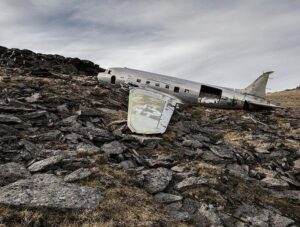 but some in large commercial planes. It may not always be possible, but a good pilot has a much better chance of landing, or really crashing their airplane and being so successful at it, that everyone walks away. The passengers are likely to have a few injuries, but they are alive, and that is what matters.
but some in large commercial planes. It may not always be possible, but a good pilot has a much better chance of landing, or really crashing their airplane and being so successful at it, that everyone walks away. The passengers are likely to have a few injuries, but they are alive, and that is what matters.
German photographer Dietmar Eckell has made it his life’s work to find, what he calls “miracles in aviation history” at the abandoned sites of wrecks that have resulted in no casualties. Eckell’s photo-project, “Happy End” highlights 15 airplanes that had forced landings, in which all the people on board survived and were rescued from really remote locations. One thing I don’t always understand is that the planes are abandoned where they crashed. I suppose sometimes it is hard to recover them, and other times they have already been there for years, by the time they are located. I never knew how many planes litter the earth, both above and below the water, but there are many.
Two of the “miracle crashes” that Eckell photographed were the Douglas Skytrain C-47 that crashed in the  Yukon in Canada in February 1950 and the Avro Shackleton, that crashed in the Western Sahara in 1994. In the crash of the Douglas Skytrain, all 10 people aboard survived, even in the frigid conditions. With the Avro Shackleton, two engines of the plane suddenly failed, sending it down to the desert sand in 1994. Surviving this crash in such an inhospitable environment was an astonishing feat for the 19 passengers and crew. If it weren’t for Dietmar Eckell’s determination to search out and photograph these lost “miracle crash” sites, much of the history of these miracles might have been forgotten. I for one plane to look up his “Happy End” project to read more about the “miracle crashes” he found.
Yukon in Canada in February 1950 and the Avro Shackleton, that crashed in the Western Sahara in 1994. In the crash of the Douglas Skytrain, all 10 people aboard survived, even in the frigid conditions. With the Avro Shackleton, two engines of the plane suddenly failed, sending it down to the desert sand in 1994. Surviving this crash in such an inhospitable environment was an astonishing feat for the 19 passengers and crew. If it weren’t for Dietmar Eckell’s determination to search out and photograph these lost “miracle crash” sites, much of the history of these miracles might have been forgotten. I for one plane to look up his “Happy End” project to read more about the “miracle crashes” he found.

 I woke up this morning to about three inches of snow, which has now turned into about twelve to fifteen inches. Spring officially started on March 20th, so my question is…WHY are we looking at so much snow!!! Businesses are closed, schools are on a homeschool day for today and tomorrow, and many of the roads are closed or have “No unnecessary travel” restrictions. I know Spring snowstorms are not that unusual, but I don’t have to like them. Ok, that’s my rant. This isn’t the first Spring snowstorm I’ve ever been through, and most likely won’t be the last. In fact, I remember a few from my childhood, that have been doozies!!
I woke up this morning to about three inches of snow, which has now turned into about twelve to fifteen inches. Spring officially started on March 20th, so my question is…WHY are we looking at so much snow!!! Businesses are closed, schools are on a homeschool day for today and tomorrow, and many of the roads are closed or have “No unnecessary travel” restrictions. I know Spring snowstorms are not that unusual, but I don’t have to like them. Ok, that’s my rant. This isn’t the first Spring snowstorm I’ve ever been through, and most likely won’t be the last. In fact, I remember a few from my childhood, that have been doozies!!
We had a storm in 1973, that totally qualifies as “a doozy” and one I’ll never forget. I had to get up on the roof of my parents’ house and shovel the snow off. The news told everyone that too much snow could cause the roof to collapse. That was the first I had ever heard of such a thing. These days, it’s common knowledge. Of course, 
 schools were closed with that storm too, and people were actually getting around on snowmobiles in town. I remember thinking ho strange that was. Still, there were people who needed to get places, and people with snowmobiles were helping them get there. I didn’t hear of any emergency childbirths with that storm, but I suppose it was possible.
schools were closed with that storm too, and people were actually getting around on snowmobiles in town. I remember thinking ho strange that was. Still, there were people who needed to get places, and people with snowmobiles were helping them get there. I didn’t hear of any emergency childbirths with that storm, but I suppose it was possible.
My niece, Chantel Balcerzak was just a teeny, little girl of two, and the snow was taller than she was. Of course, Chantel is only 4’10” now, so not much has changed, and she might want to stay indoors, so she doesn’t get lost. My dad, her grandpa, Al Spencer took her outside for a picture to commemorate the occasion. Like most snow days, the fre day presented us with a perfect opportunity for fun in the snow, and we took full advantage with snowball fights and trudging through the depths of the “white stuff” that covered the city. It’s funny how that snowstorm seemed so fun, and these days such a storm is just annoying.
I suppose things could be worse. I could be one of those 
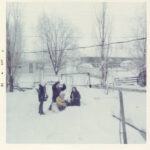 people who will lose wages due to businesses closing, or who have to figure out daycare for children who are now home from school, or who will have to figure out a way to get to work , because my job doesn’t close for snow. Since I am retired, I will just get cozy with a fire going, and watch some television…oh wait, the internet is down which means that my television, email, and internet aren’t working. Thankfully there is wi-fi, so at least there is my phone. That’s my day, I hope you all have a wonderful doozy of a snow day!!
people who will lose wages due to businesses closing, or who have to figure out daycare for children who are now home from school, or who will have to figure out a way to get to work , because my job doesn’t close for snow. Since I am retired, I will just get cozy with a fire going, and watch some television…oh wait, the internet is down which means that my television, email, and internet aren’t working. Thankfully there is wi-fi, so at least there is my phone. That’s my day, I hope you all have a wonderful doozy of a snow day!!
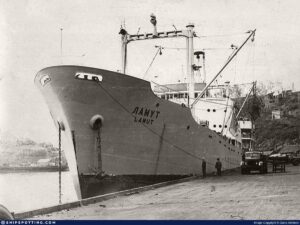
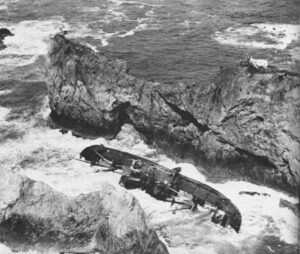 During World War II and really with any war, any coastal area of the United States had to be kept on a higher alert than during peacetime. Coastal defense networks now are much more technological that they were in 1943. During World War II, the West Coast was patrolled by units of men whose job it was to watch for activities that were out of the ordinary along the Olympic Coast of Washington. Normally, their job was pretty boring, unless you liked walking or driving along the coast looking at the ocean. There were ships out there, but most of them were where they were supposed to be and were not cause for concern.
During World War II and really with any war, any coastal area of the United States had to be kept on a higher alert than during peacetime. Coastal defense networks now are much more technological that they were in 1943. During World War II, the West Coast was patrolled by units of men whose job it was to watch for activities that were out of the ordinary along the Olympic Coast of Washington. Normally, their job was pretty boring, unless you liked walking or driving along the coast looking at the ocean. There were ships out there, but most of them were where they were supposed to be and were not cause for concern.
In the early spring of 1943, however, coastal lookout activities along the Olympic Peninsula suddenly took a turn from the mundane to something quite unusual. As the La Push unit patrolled the beach that day, they suddenly began to see debris on the beach. That is never a good thing to see, because it means that somewhere, there is a ship in a lot of trouble. Rain, wind, and heavy seas just before midnight on April 1st, were driving the Russian steamship Lamut toward the shoreline, and behind a jagged cluster of rocks just off Teahwhit Head. By the early morning hours of April 2nd, the ship was in great peril, and the lives of the crew hung in the balance.
The La Push patrol unit was in for an intense morning, as they would find at first light on April 2nd. When the  patrolmen began finding wreckage on the beach, they headed south along the beach to see if they might find the ship in trouble. It wasn’t long before they sighted part of the grounded ship. It was lodged between a hundred-foot cliff and a small, jagged rock island. Amazingly, there were survivors huddled high on the steeply sloping deck of the Russian ship called Lamut. They wouldn’t have lasted long on that deck, but the high seas made a sea rescue impossible. The coast guardsmen of the La Push Unit decided to attempt a rescue by land. That would be pretty treacherous in itself, but they had no other choice.
patrolmen began finding wreckage on the beach, they headed south along the beach to see if they might find the ship in trouble. It wasn’t long before they sighted part of the grounded ship. It was lodged between a hundred-foot cliff and a small, jagged rock island. Amazingly, there were survivors huddled high on the steeply sloping deck of the Russian ship called Lamut. They wouldn’t have lasted long on that deck, but the high seas made a sea rescue impossible. The coast guardsmen of the La Push Unit decided to attempt a rescue by land. That would be pretty treacherous in itself, but they had no other choice.
This would not be a quick rescue. By mid-morning, the members of the rescue party had cut a path through the thick underbrush bordering the beach. Then, they began their ascent along the slippery boulders to the top of the cliff above the smashed ship. They would have to get very creative in their rescue maneuvers. “Using gauze bandage weighted with a rock, a light line was lowered to the eager hands of the stranded crew aboard the Lamut. Tying heavier line to the gauze, one line succeeded another until a lifeline strong enough to support the weight of a single person was stretched between the ship and the cliff. One by one survivors were raised to the cliff top and finally assisted down the landward side of the rocky ridge to the beach below. As darkness approached, the last of the Lamut survivors emerged from the swampy beach trail to waiting coast guard trucks and ambulances.” The rescue of the Lamut crew was among the most dramatic events in the annals of World War II beach patrol history.
While this was just one of the rescues conducted by the Olympic Defense Network, it was undoubtedly the most intense rescue they performed in their years of service. On March 29, 1944, the beach patrol ended and a week 
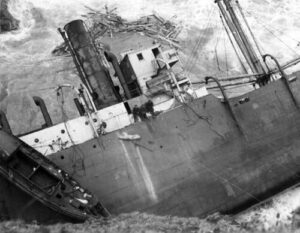 later the unit decommissioned. The trails in that area are now a part of the Olympic National Park probably date from the era of World War II beach patrol activities. A while back, a small, collapsed wood frame cabin was located at Teahwhit Head. It is believed to be associated with World War II beach patrolling activities in the La Push unit, and quite possibly belongs to the Lamut.
later the unit decommissioned. The trails in that area are now a part of the Olympic National Park probably date from the era of World War II beach patrol activities. A while back, a small, collapsed wood frame cabin was located at Teahwhit Head. It is believed to be associated with World War II beach patrolling activities in the La Push unit, and quite possibly belongs to the Lamut.
 Every year, maybe simply because Winter can be so depressing, just a little way into Spring, we have a day for fun. If you didn’t know, the day is called April Fool’s Day. Some like the day, others kind of hate it, and some don’t care one way or the other. Still, I think most people give the day a try, at least. As a kid, we tried to pull off the best prank ever, but depending on our age at the time, we often failed miserably. You can only tell someone there is a spider on their head so many times on April Fool’s Day, before they simply stop believing your story.
Every year, maybe simply because Winter can be so depressing, just a little way into Spring, we have a day for fun. If you didn’t know, the day is called April Fool’s Day. Some like the day, others kind of hate it, and some don’t care one way or the other. Still, I think most people give the day a try, at least. As a kid, we tried to pull off the best prank ever, but depending on our age at the time, we often failed miserably. You can only tell someone there is a spider on their head so many times on April Fool’s Day, before they simply stop believing your story.
My parents, Al and Collene Spencer, were pretty good at April Fool’s Day pranks. I remember putting sugar on chicken and salt on cereal. I suppose some people would get upset about that, but we all had a good sense of humor, and found it to be a good  laugh. Of course, there are hundreds of other pranks that can be played on people, and some of them are very elaborate. I guess it just depends on the level of imagination you have, and how far you are willing to play your prank out. For some people, April Fool’s Day just isn’t enough, and they become Bonafide Pranksters, ready to prank their next victim at any given moment. Their pranks might happen at any time on any day, which can also be very funny.
laugh. Of course, there are hundreds of other pranks that can be played on people, and some of them are very elaborate. I guess it just depends on the level of imagination you have, and how far you are willing to play your prank out. For some people, April Fool’s Day just isn’t enough, and they become Bonafide Pranksters, ready to prank their next victim at any given moment. Their pranks might happen at any time on any day, which can also be very funny.
April Fool’s Day has always seemed to me as the real beginning of Spring, even though Spring officially begins on March 20th, the weather then is usually so windy and cold here in Wyoming, that I just don’t really think much about Spring until April Fool’s Day. Then, there is usually more chance of temperatures in at least the  40s, so I can actually envision Spring flowers. Whether I choose to play any pranks or not, doesn’t matter as much to me as the distinct prospect of the coming Spring. I am more of a late Spring or Summer girl, but if it’s a choice of Winter or Spring, I’ll take Spring every time…and I truly love Spring flowers.
40s, so I can actually envision Spring flowers. Whether I choose to play any pranks or not, doesn’t matter as much to me as the distinct prospect of the coming Spring. I am more of a late Spring or Summer girl, but if it’s a choice of Winter or Spring, I’ll take Spring every time…and I truly love Spring flowers.
If you decide to prank, I hope you are successful in your pranks, without anyone getting mad at you. And if you don’t decide to prank, well sometimes it’s more fun to watch other people get pranked, as long as no one notices that you are sitting quietly by without a prank in sight, because if they notice you, you are very likely is big trouble. Happy April Fool’s Day everyone. Have fun!!

 My niece, Elizabeth “Liz” Masterson is a remarkable woman, and you will hear the same statement from anyone who knows her. Liz is a journalism teacher at Kelly Walsh High School and has been teaching since 2004…first at Natrona County High School, and then back to her Alma Mater…Kelly Walsh High School. She is a favorite among her students and stays in touch with many of them. They all truly love her, and every so often, Liz hears a story about herself from fellow teachers and students, that takes her by surprise, because Liz is not one to “toot her own horn” or even to realize how amazing she is.
My niece, Elizabeth “Liz” Masterson is a remarkable woman, and you will hear the same statement from anyone who knows her. Liz is a journalism teacher at Kelly Walsh High School and has been teaching since 2004…first at Natrona County High School, and then back to her Alma Mater…Kelly Walsh High School. She is a favorite among her students and stays in touch with many of them. They all truly love her, and every so often, Liz hears a story about herself from fellow teachers and students, that takes her by surprise, because Liz is not one to “toot her own horn” or even to realize how amazing she is.
While Elizabeth was at dinner the other night with two of her teacher friends, one told her that she had overheard two of her students talking about Elizabeth, and “how great she is!” Being the very down-to-earth person she is, Elizabeth is always surprised and shocked to hear this kind of thing. It’s a compliment, but it embarrasses her a little, too. The teacher heard a teenage girl tell the guy she was talking with that she had just been introduced to “Ms. Mast” (the name the students have given her over the years) so that Elizabeth could give her a little help on a project, and that it was literally like she had experienced a “celebrity encounter!” These were the student’s own words. This was the, albeit “dramatic,” conversation overheard by a teacher, between two kids talking to each other, but these were this young lady’s feelings.
What my sister, Cheryl Masterson, who is Liz’s mom, so enjoyed about this “celebrity encounter” story is that it is not only hilarious, but also sweet. In the family, we have all been impressed with Liz’s ability to connect with and mentor her students, but seeing it through the eyes of a young lady who had only known OF Elizabeth before…a young lady who was very pleased that she was now able to actually know her…a young lady who had entered “Elizabeth’s circle,” so to speak, was well…awe inspiring. It’s a very small thing in the world of life events, but for this young lady…she knew that she had experienced a “celebrity encounter” and it made her 
 day! In fact, the event so impressed her, that she and her friend were still talking about it when they got to this teacher’s classroom!
day! In fact, the event so impressed her, that she and her friend were still talking about it when they got to this teacher’s classroom!
Cheryl is certain that Elizabeth’s friend laughingly, and lovingly, rolled her eyes, but still it was very endearing for her, as Elizabeth’s good friend, to hear, and to pass such a sweet story to Elizabeth. As the journalism teacher, who also creates the school newspaper and the school yearbook with her students, Elizabeth tirelessly attends nearly every single function and school event the school has. All sports events, all dances, all activities of any kind. She takes pictures of all the events, and of all the kids at these events, and she gives all that she has to these students all school year long. The students and parents see it and appreciate it! Truly, Elizabeth is a fixture at her school. She is chosen almost every single year by some student as their favorite and most influential teacher, and recognized for that, among other teachers, at a special dinner the schools have, every year. Whether she knows all the kids or not, they ALL know her! She has a reputation among the students as being salty, sassy, and no-nonsensical, but a lot of fun to be around, and they learn a lot from her! She is one of a kind! She is blessed and she is a blessing to others.
Elizabeth’s students often go on to great things, but some stand out just a little bit more than others, like Meagan Degenfelder, who was just elected as Wyoming’s Superintendent of Public Instruction. It was a proud moment for Elizabeth, as her former teacher too, and she was invited to attend the inauguration, and also had the opportunity to meet Wyoming’s Governor Mark Gordon at the inauguration gala.
Liz loves teaching and all her students, but she is also a well-rounded person. She loves going to concerts, and has attended approximately ten with her sister, Jenny, but Liz has attended hundreds more with friends, students, and her other sisters. She is a great aunt, who has taken nieces and nephews to movies and games, and 

 has showed up for them on their birthdays and all accomplishments. She is an amazing mentor for her nieces and nephews as well. Liz not only teaches young people how to be successful in all they do, but she lives what she teaches too. Today is Liz’s birthday. Happy birthday Liz!! Have a great day!! We love you and we are very proud of you!!
has showed up for them on their birthdays and all accomplishments. She is an amazing mentor for her nieces and nephews as well. Liz not only teaches young people how to be successful in all they do, but she lives what she teaches too. Today is Liz’s birthday. Happy birthday Liz!! Have a great day!! We love you and we are very proud of you!!
 If King George III was hoping to keep the New England colonies dependent on the British by placing taxes, restrictions, lockdowns, and the New England Restraining Act on them, he greatly underestimated the colonists. The New England Restraining Act was endorsed by King George III on March 30, 1775. The Act required New England colonies to trade exclusively with Great Britain as of July 1, 1775, with an additional rule going into effect on July 20, banning colonists from fishing in the North Atlantic.
If King George III was hoping to keep the New England colonies dependent on the British by placing taxes, restrictions, lockdowns, and the New England Restraining Act on them, he greatly underestimated the colonists. The New England Restraining Act was endorsed by King George III on March 30, 1775. The Act required New England colonies to trade exclusively with Great Britain as of July 1, 1775, with an additional rule going into effect on July 20, banning colonists from fishing in the North Atlantic.
The Restraining Act and the Conciliatory Proposition were introduced to Parliament by British prime minister, Frederick, Lord North, on the same day. The Conciliatory Proposition promised that no colony that met its share of imperial defenses and paid royal officials’ salaries of their own accord would be taxed…a ridiculous statement, because the very act of making the forced payments was basically taxing. Supposedly, the British were  conceding to the colonists’ demand that they be “allowed to provide the crown with needed funds on a voluntary basis.” Through the preposition, Parliament would ask for money through requisitions, not demand it through taxes. If you ask me, that is a distinction without a difference. Either way, the colonists were forced to pay for things they shouldn’t have to. The Restraining Act was meant to appease Parliamentary hardliners, who would otherwise have impeded passage of the pacifying proposition. So, Lord North had to work both sides against the middle to get the Conciliatory Proposition passed.
conceding to the colonists’ demand that they be “allowed to provide the crown with needed funds on a voluntary basis.” Through the preposition, Parliament would ask for money through requisitions, not demand it through taxes. If you ask me, that is a distinction without a difference. Either way, the colonists were forced to pay for things they shouldn’t have to. The Restraining Act was meant to appease Parliamentary hardliners, who would otherwise have impeded passage of the pacifying proposition. So, Lord North had to work both sides against the middle to get the Conciliatory Proposition passed.
Unfortunately for North and prospects for peace, General Thomas Gage had already received orders from London to march on Concord, Massachusetts. His orders were to destroy the armaments stockpiled in the town and take Patriot leaders John Hancock and Samuel Adams into custody. Gage had received the orders in January 1775 and arrived in Boston before the Conciliatory Proposition, meaning that he didn’t know about the  agreement made to stop the taxing of the colonists. So, on April 18, 1775, an army of 700 Redcoats marched towards Concord Bridge. It was basically the last straw…the military action that would lead to the Revolutionary War, the birth of the United States as a new nation, the temporary downfall of Lord North, and the near abdication of King George III. The Treaty of Paris marked the end of the conflict and guaranteed New Englanders the right to fish off Newfoundland. It was the very right denied them by the New England Restraining Act. The British learned that they could only push the colonists so far, and then they would lose control of the very people they tried to enslave.
agreement made to stop the taxing of the colonists. So, on April 18, 1775, an army of 700 Redcoats marched towards Concord Bridge. It was basically the last straw…the military action that would lead to the Revolutionary War, the birth of the United States as a new nation, the temporary downfall of Lord North, and the near abdication of King George III. The Treaty of Paris marked the end of the conflict and guaranteed New Englanders the right to fish off Newfoundland. It was the very right denied them by the New England Restraining Act. The British learned that they could only push the colonists so far, and then they would lose control of the very people they tried to enslave.



